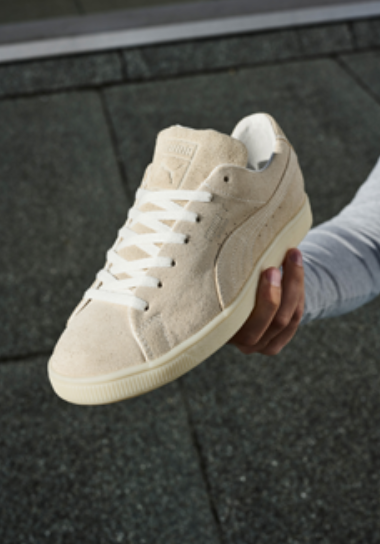PUMA TAKES GIANT STEPS WITH COMPOSTABLE RE:SUEDE SHOES
By: Shien Zutshi
Get ready for a game-changing revelation in the world of sustainable fashion! Brace yourselves as Puma, the trailblazing sportswear giant, unveils its latest marvel: Re:Suede shoes. A decade since its first foray into compostable footwear, Puma is back with a bang, and this time, they've done it.
If you've ever thought about the daunting challenges of global warming and the ever-mounting landfill crisis, Puma has just dropped a revolutionary experiment that tackles both issues head-on. Enter the realm of Re:Suede shoes – an ingenious fusion of environmental consciousness and style that promises to alleviate the guilt of discarding old sneakers.
Traditional Puma Sneakers Credit: Nik @helloimnik
Led by the visionary biologist Stephen Mayfield and the seasoned product developer Tom Cooke, Puma's Re:Suede shoes signify a seismic shift in the industry's approach to mitigating the environmental impact of discarded footwear. This isn't just a pair of shoes; it's a conscious stride towards a more sustainable future, where fashion and responsibility seamlessly coexist. So, gear up to step into a world where your footwear doesn't just make a statement in style but also in preserving our precious planet.
So What Happened? Re:Suede Experiment:
Puma distributed 500 Re:Suede shoes to testers for six months in a groundbreaking experiment. After the trial period, 412 shoes were returned and sent to an industrial composting facility in The Netherlands. These stunning shoes, primarily made of Zeology suede, hemp padding, and laces, showcased impressive decomposition within approximately six months.
RE:SUEDE Sneakers
But What is Zeology Suede?
Puma's Re:Suede shoe which uses Zeology suede, is a compostable, biodegradable and circular leather. It is a suede, tanned using zeolite minerals, free of chrome, aldehyde, and heavy metals. The use of hemp for padding and laces, along with a hemp-cotton blend for the lining, showcases a commitment to sustainable materials.
But wait, is this just another case of greenwashing?
Fear not, for Puma has gone the extra mile to ensure that their eco-friendly claims are more than just a marketing gimmick. Through a groundbreaking composting partnership with Dutch waste company Ortessa, Puma is poised to make a tangible impact on the planet.
The composting journey begins by shredding the Re:Suede shoes and subjecting the fragments to ideal conditions within a composting tunnel. As the process unfolds, the granules are systematically filtered out and transformed into top-notch compost, ready to breathe life into new vegetation. Ortessa estimates that the entire shoe undergoes complete decomposition in a mere six months, proving that Puma's commitment to sustainability is not just skin-deep but deeply rooted in real, transformative action.
Context of Sustainability in Fashion:
The significance of Puma's biodegradable shoes is magnified against the backdrop of the challenges in recycling clothing. With only 13.6% of garments recycled in the US, the article emphasizes the complexities involved in recycling due to textile blends, components like zippers, and the current limitations of mechanical and chemical recycling methods.
The Need for Sustainable Fashion Practices:
Highlighting the importance of addressing the recyclability of garments, the article suggests that consumers can play a role by making conscious choices and designers can contribute by incorporating recycle-friendly textiles and reducing embellishments. Researchers globally are exploring innovative methods, such as using fungi to break down blends, to enhance the recyclability of clothing.
Conclusion:
Though this is not the first compostable shoe, it does demonstrate an effort on the part of the company to think a bit greener and more consciously. Puma's Re:Suede shoes exemplify a promising step forward in sustainable fashion, offering a glimpse into a future where even traditionally challenging items like sneakers can leave a positive environmental impact. As consumers, designers, and companies join hands, the fashion industry holds the potential to foster a more sustainable and eco-friendly ethos.
Sources: https://about.puma.com/sites/default/files/documents/pdf/resuede-puma-handbook.pdf


